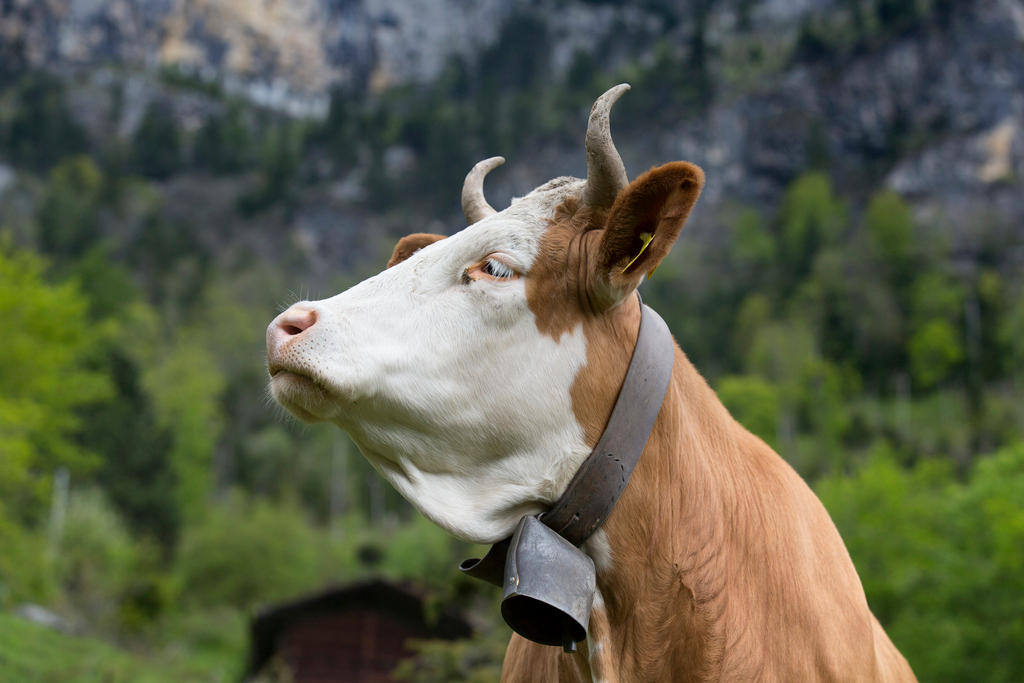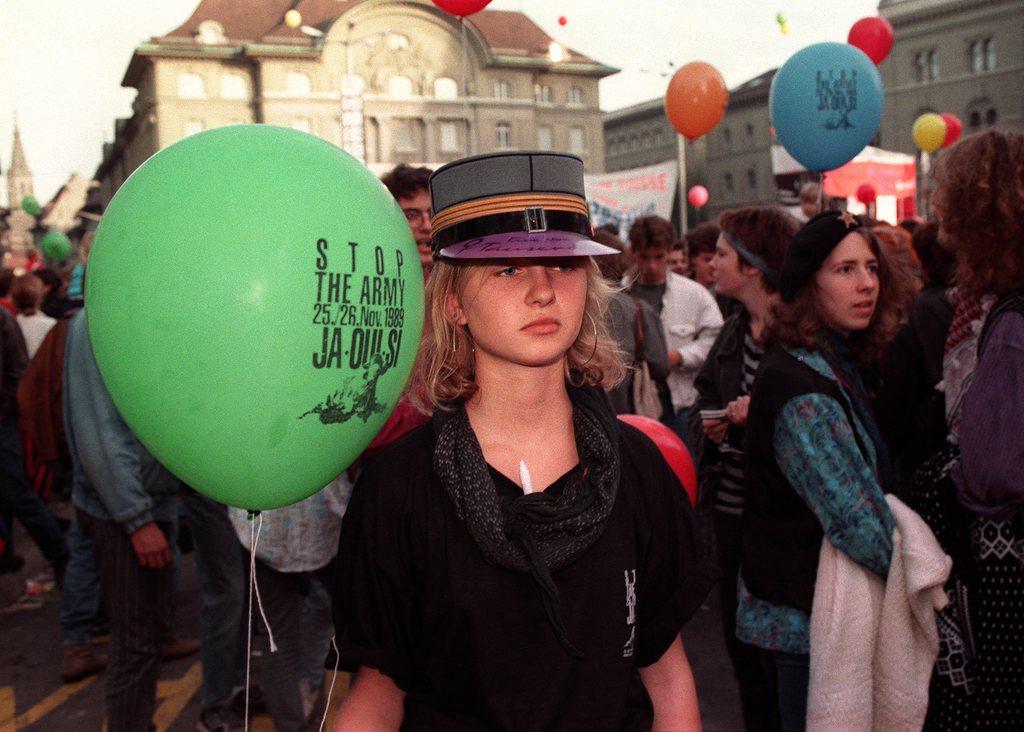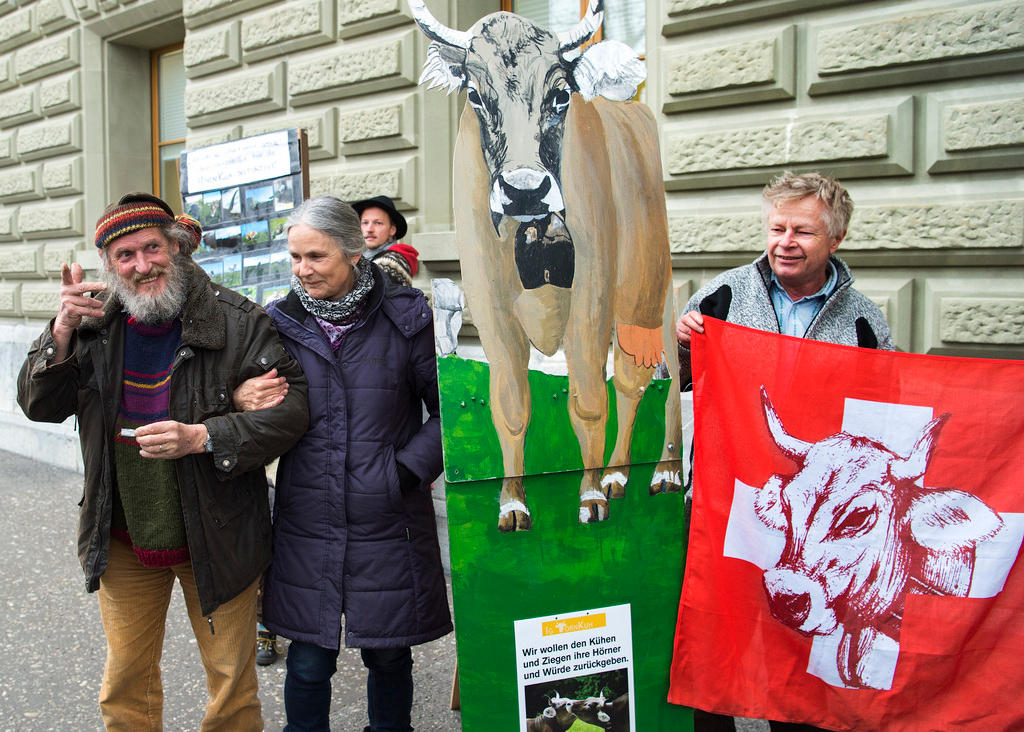Bizarre or idealistic? Swiss initiatives come in all forms

As part of the country’s direct democratic system, Swiss voters have a say on cow horns, hiking paths or even minarets: issues that may appear exotic and that sometimes attract worldwide attention.
It’s often said that other countries look to Switzerland with a mixture of envy and admiration because of the possibility to bring a wide variety of issues to a nationwide vote.
Indeed, the people’s initiative is a tenet of Swiss democracy that gives citizens – in theory – the right to have the final say even on issues that can range from the seemingly minor to the utopian or revolutionary.
The cow horn initiative, which will come to a vote on November 25, is just the latest example. Who would have thought that a mountain farmer might force a nationwide vote on a constitutional amendment after collecting the necessary 100,000 signatures within 18 months?
For political scientist Marc Bühlmann from Bern University, the horn cow initiative is proof of the functioning of the direct democratic system. Even if it means that seemingly secondary issues are enshrined in the Swiss constitution?
It is a fundamental right of every Swiss citizen to use the initiative as a tool to participate and engage in politics.
Environmental issues
A look back over recent history shows that issues related to traffic were high on the agenda of people’s concerns in the 1970s.
An initiative calling for 12 car-free Sundays per year was thrown out by voters in 1978; it was obviously considered a far-fetched idea. But a year later, a constitutional amendment to promote footpaths and hiking trails won approval at the ballot box.
Another people’s initiative aimed at preventing the construction of three separate motorway sections in different parts of the country was rejected in 1990 amid warnings by the transport minister who saw Switzerland’s road infrastructure at stake.
But despite the rejection, it sent a signal to the authorities to take into account growing environmental concerns about traffic projects.
Army, holidays
An initiative to scrap Switzerland’s armed forces was also rejected by voters but the impact of the 35.6% of yes votes in 1989 was considerable as it rocked the self-perception of a society with its traditional militia army system.
The result prompted a series of reforms in the army, including a reduction in the number of troops, and the introduction of a civilian service.
In more recent years, the rejection of an additional week’s statutory holidays per year by voters made many people outside Switzerland shake their heads in disbelief.
Similarly, an initiative to introduce a guaranteed basic income did not win approval of Swiss voters in 2016.
This leaves the question: Does Switzerland need more cow horns?
Ban on religious slaugther: The first people’s initiative in modern Swiss history came to a nationwide vote on August 20, 1893. It won voters’ approval with 60.1%. The initiative was launched by cantonal animal protection groups and was aimed at banning the shechita practised by the Jewish community.
Car-free Sundays: The initiative wanted to introduce 12 car-free Sundays per year. It was rejected by 63.7% of voters on May 28, 1978.
Promotion of footpaths: An initiative demanding the promotion of footpaths and hiking trails was withdrawn by the promoters. But a counter-proposal was approved by voters with 77.6% in a nationwide ballot on February 18, 1979.
Motorways: An environmental group tried to prevent the construction of a motorway section outside Zurich by forcing a nationwide vote. But the initiative, which also included projects in other parts of the country, failed to win a majority at the ballot box on April 1, 1990. As a result, the Zurich bypass was opened in 2009 with considerable changes to the initial project.
Sunday initiative: The idea of four car-free Sundays a year was rejected by 62.4% of voters on May 18, 2003. The promoters wanted to give priority to pedestrians and cyclists on roads and public squares as part of a four-year trial.
Minaret ban: The initiative was approved by 57.5% of voters on November 29, 2009. Making international headlines, it bans the construction of new minarets across the country.
More holidays: Launched by the trade union group, Travail Suisse, the initiative called for minimum statutory holidays of six weeks annually. Two-thirds of voters rejected the proposal at the ballot box on March 11, 2012.
Guaranteed basic income: The promoters of the initiative called for the introduction of a guaranteed basic income. The idea was thrown out by voters with 76.9% on June 5, 2016.
Cow horns: The promoters of the initiative demand government subsidies for farmers who keep cows and goats with horns. The vote will take place on November 25, 2018.

More
Every three months, a revolution
Adapted from German/urs

In compliance with the JTI standards
More: SWI swissinfo.ch certified by the Journalism Trust Initiative



You can find an overview of ongoing debates with our journalists here. Please join us!
If you want to start a conversation about a topic raised in this article or want to report factual errors, email us at english@swissinfo.ch.